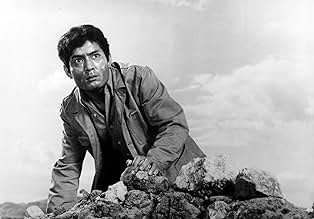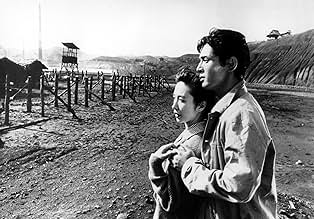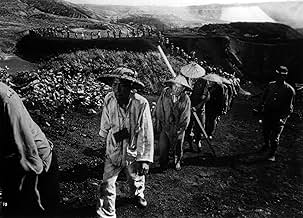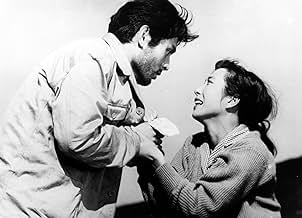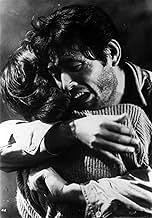ÉVALUATION IMDb
8,5/10
10 k
MA NOTE
Ajouter une intrigue dans votre langueA Japanese pacifist, unable to face the dire consequences of conscientious objection, is transformed by his attempts to compromise with the demands of war-time Japan.A Japanese pacifist, unable to face the dire consequences of conscientious objection, is transformed by his attempts to compromise with the demands of war-time Japan.A Japanese pacifist, unable to face the dire consequences of conscientious objection, is transformed by his attempts to compromise with the demands of war-time Japan.
- Director
- Writers
- Stars
- Prix
- 5 victoires et 1 nomination au total
Kôji Nanbara
- Kô
- (as Shinji Nanbara)
Avis en vedette
10OttoVonB
Masaki Kobayashi's reflection on the Japanese experience in occupying Manchuria, fighting World War II, and dealing with defeat is a staggering piece of cinema. Clocking in at just under 10 hours, "The Human Condition" – what a title! – takes us on a journey with Kaji (Tatsuya Nakadai) through a POW film, a war film and a survival film, tied together by a loose love story, weaving all these strands together with great care over its epic but impeccably paced run-time.
The first part sees Kaji, a young, well-to-do Japanese, begin work as labor supervisor in a POW camp in occupied Manchuria. What could have been an interesting honeymoon with new loving wife Michiko and the start to a promising career slowly devolves into a nightmare: Kaji tries to stay true to his human principles while getting increasingly tangled in a complex web that involves escaping prisoners, abusive guards, and a tyrannical, bullish army that is above the law.
As an indictment of the Japanese Imperial Army, it is all the more haunting for coming from one who served under it. And to Kobayashi's credit, never does this come across as a crass moral lecture. It is a stunning, gripping study in mounting desperation, anchored by a powerful turn from the ever-dependable Nakadai.
Japanese cinema of this period has its quirks, stylish acting and a tendency to melodrama that can bemuse Western viewers. While I find Kobayashi less impaired by these traits than many of his contemporaries – especially in the cold, restrained anger and sorrow of Harakiri, his masterpiece – he gets heroic support from his star of choice. Far from the histrionics and bravado of a Toshiro Mifune, Japan's other megastar of the 50s and early 60s, Tatsuya Nakadai's magnetic charisma is far more subdued and heartfelt. Though our hero is at times unbelievably decent, perhaps buoyed by his youthful optimism and love for his wife, Nakadai makes every situation and painful decision resonate.
The technical credits are the usual for this under-appreciated director's work: arresting visuals, sweeping movement, carefully crafted sets. And the supporting players leave their mark, with a stand-out in each episode. In this instance, particularly Kaji's conflicted assistant, originally mistakable for a simple brute, finds very different ways of dealing with his own crisis of conscience.
This is definitely a film you have to see. Just make sure you clear your schedule, as you don't want to spread the viewing chunks too thin if watching in fragments
The first part sees Kaji, a young, well-to-do Japanese, begin work as labor supervisor in a POW camp in occupied Manchuria. What could have been an interesting honeymoon with new loving wife Michiko and the start to a promising career slowly devolves into a nightmare: Kaji tries to stay true to his human principles while getting increasingly tangled in a complex web that involves escaping prisoners, abusive guards, and a tyrannical, bullish army that is above the law.
As an indictment of the Japanese Imperial Army, it is all the more haunting for coming from one who served under it. And to Kobayashi's credit, never does this come across as a crass moral lecture. It is a stunning, gripping study in mounting desperation, anchored by a powerful turn from the ever-dependable Nakadai.
Japanese cinema of this period has its quirks, stylish acting and a tendency to melodrama that can bemuse Western viewers. While I find Kobayashi less impaired by these traits than many of his contemporaries – especially in the cold, restrained anger and sorrow of Harakiri, his masterpiece – he gets heroic support from his star of choice. Far from the histrionics and bravado of a Toshiro Mifune, Japan's other megastar of the 50s and early 60s, Tatsuya Nakadai's magnetic charisma is far more subdued and heartfelt. Though our hero is at times unbelievably decent, perhaps buoyed by his youthful optimism and love for his wife, Nakadai makes every situation and painful decision resonate.
The technical credits are the usual for this under-appreciated director's work: arresting visuals, sweeping movement, carefully crafted sets. And the supporting players leave their mark, with a stand-out in each episode. In this instance, particularly Kaji's conflicted assistant, originally mistakable for a simple brute, finds very different ways of dealing with his own crisis of conscience.
This is definitely a film you have to see. Just make sure you clear your schedule, as you don't want to spread the viewing chunks too thin if watching in fragments
This is an excellent film about one man attempting to change the system. Kaji brings his youthful enthusiasm, idealism, and humanism against a cruel, unjust machine. The acting, direction, and cinematography are all world class. This is a gripping film which will leave you yearning for part two. This is just the start of a stunning epic.
In the World War II, the pacifist and humanist Japanese Kaji (Tatsuya Nakadai) accepts to travel with his wife Michiko (Michiyo Aratama) to the tiny Manchurian village Loh Hu Liong to work as supervisor in an iron ore mine to avoid to be summoned to the military service. Kaji, who defends communists principles, works with Okishima (Sô Yamamura) and he implements a better treatment to the laborers and improves the mine production.
When the feared Kempetai (The "Military Police Corps", the military police arm of the Imperial Japanese Army from 1881 to 1945) brings six hundred Chinese POWs to the mine, Kaji negotiates with their leaders expecting them to control their comrades. However the methods of Kaji upset the corrupt system in the site, and the foreman Furuya (Kôji Mitsui) plots a scheme to use the naive Chen (Akira Ishihama) to turn off the electrical power of the barbwire fences to allow the prisoners to escape.
When seven prisoners are falsely accused of an attempt of fleeing, a cruel Kempetai sergeant uses his sword to behead the prisoners. When Kaji protests, the POWs react sparing the lives of four prisoners but Kaji is arrested and tortured. When he is released, he is summoned to join the army and accused of being Red.
"The Human Condition – Parts I & II" is the anti-war masterpiece by Masaki Kobayashi. The story is impressively realistic and magnificently shot with top-notch camera work, giving the sensation of a documentary. I bought the box released by the Criterion approximately one year ago, and only today I have just watched the two first DVD with about 400 minutes running time. Tomorrow I will finish watching this masterpiece. My vote is ten.
Title (Brazil): Not Available
When the feared Kempetai (The "Military Police Corps", the military police arm of the Imperial Japanese Army from 1881 to 1945) brings six hundred Chinese POWs to the mine, Kaji negotiates with their leaders expecting them to control their comrades. However the methods of Kaji upset the corrupt system in the site, and the foreman Furuya (Kôji Mitsui) plots a scheme to use the naive Chen (Akira Ishihama) to turn off the electrical power of the barbwire fences to allow the prisoners to escape.
When seven prisoners are falsely accused of an attempt of fleeing, a cruel Kempetai sergeant uses his sword to behead the prisoners. When Kaji protests, the POWs react sparing the lives of four prisoners but Kaji is arrested and tortured. When he is released, he is summoned to join the army and accused of being Red.
"The Human Condition – Parts I & II" is the anti-war masterpiece by Masaki Kobayashi. The story is impressively realistic and magnificently shot with top-notch camera work, giving the sensation of a documentary. I bought the box released by the Criterion approximately one year ago, and only today I have just watched the two first DVD with about 400 minutes running time. Tomorrow I will finish watching this masterpiece. My vote is ten.
Title (Brazil): Not Available
10crubpni
Hello, my name's Jacob. I'm a 21 year old guy, from Israel, forced to join the army at the age of 18 as nearly all people of my country have to, forced to waste 3 years of my life doing things I'd never want to do if only I was allowed to choose. I'm not a great movie buff. I'm a simple person, and I'd rather play a video game to kill time, but I do like action and war films which is how I got to see "The human condition" on some list here on IMDb. Sounded interesting, and so I decided to watch the 3 films. So this is a review about all 3...
The films accurately demonstrates, maybe to the extreme, what it is to be a peace-loving, good human being, in a place where fascism and cruelty reigns supreme. Some people may say that Kaji's character is too unbelievable. Too saint-like, to the point where it becomes frustrating. I say it's not true- It's a movie, not real life. Kaji's behaviour might not be realistic, he faces humanity's worst traits with his own altruist ideals of pacifism and equality, as if he's some sort of WW2 superhero. Saying one cannot identify with him is wrong, however, in my humble opinion, because even if maybe you wouldn't act the way he did when put in the same situations, you can appreciate the way he handled himself, you can admire him and aspire to be like him. He isn't a saint though, he makes mistakes, born out of the cruelty and misery that surrounds him, betraying at times the "code" that he is supposed to protect and follow, but even then, you know that ultimately deep down he's the same person, no matter how things go.
Seeing many many irrational things in my military service, I can relate to Kaji in many ways. Seeing people who dedicate their lives to controlling others for the sake of getting promoted, to get appreciated by their superiors who actually appreciate them about as little as they appreciate their own soldiers. People who care for their own interests far more than they care for the interests of those they are in charge of, crushing their wants and needs and deeming them unimportant in the blink of an eye, while their own interests take much higher priority... People who enforce and follow strict rules that are unbending and unreasonable, with such a passion, that it makes you think any reasonable man would dismiss those people as insane, yet still, those are the people who are in charge, because they are the ones who stay in the army and dedicate their lives to it and to it's incredible stupidity, while the real reasonable people go on to dedicate their lives to do something that might actually be beneficial to humanity. This has now officially become somewhat of a rant of how terrible military life and discipline is, maybe more so than it is a review of this series of movies. But why I am saying all of this? because these observations of mine- they are accurately depicted in this movie. If only these real life people that I know were just trying to be a bit better, a bit more human, more like Kaji, maybe my impression of what the army is like wouldn't have been so gloomy as they are now. Kaji, in the films, tries-everywhere he goes-to set things right for those around him, he goes through so many terrible things, scenes that are so... Vile, and so distorted from what you think of human nature as it is in our usually comfortable modern life, and with sheer willpower, he triumphs, even if his triumph is just in him, staying alive while everything else is gone. But ultimately, does it do him any good? If he were to die in the first movie, would that have been better? saved him the suffering of everything he went through later? Well, that is for you to decide. What these films have taught me, is that no matter how it ends, it is important for a person to do what he sees as the right thing to do, and to never lose sight of what the right thing to do is... I'd define a good movie as one that makes you think at the end. It doesn't have to be a cool plot twist at the end that makes you think, it just has to be a movie complex enough but also engaging enough to make you think at the end, because you didn't have time to figure out everything you wanted while you were watching it. At the end of the third movie however, I didn't have to think of anything. I had already absorbed everything. All I wanted was to sleep, and just couldn't. My mind was empty, and I could feel only one thing- awe. And that is why I rate "The human condition" 10/10.
I'm terribly sorry if what you just read sounded like a bunch of drivel. Maybe this review is not for you, and maybe the movie is not for you. But regardless, I thank you for reading it to the very end. Have a nice day.
The films accurately demonstrates, maybe to the extreme, what it is to be a peace-loving, good human being, in a place where fascism and cruelty reigns supreme. Some people may say that Kaji's character is too unbelievable. Too saint-like, to the point where it becomes frustrating. I say it's not true- It's a movie, not real life. Kaji's behaviour might not be realistic, he faces humanity's worst traits with his own altruist ideals of pacifism and equality, as if he's some sort of WW2 superhero. Saying one cannot identify with him is wrong, however, in my humble opinion, because even if maybe you wouldn't act the way he did when put in the same situations, you can appreciate the way he handled himself, you can admire him and aspire to be like him. He isn't a saint though, he makes mistakes, born out of the cruelty and misery that surrounds him, betraying at times the "code" that he is supposed to protect and follow, but even then, you know that ultimately deep down he's the same person, no matter how things go.
Seeing many many irrational things in my military service, I can relate to Kaji in many ways. Seeing people who dedicate their lives to controlling others for the sake of getting promoted, to get appreciated by their superiors who actually appreciate them about as little as they appreciate their own soldiers. People who care for their own interests far more than they care for the interests of those they are in charge of, crushing their wants and needs and deeming them unimportant in the blink of an eye, while their own interests take much higher priority... People who enforce and follow strict rules that are unbending and unreasonable, with such a passion, that it makes you think any reasonable man would dismiss those people as insane, yet still, those are the people who are in charge, because they are the ones who stay in the army and dedicate their lives to it and to it's incredible stupidity, while the real reasonable people go on to dedicate their lives to do something that might actually be beneficial to humanity. This has now officially become somewhat of a rant of how terrible military life and discipline is, maybe more so than it is a review of this series of movies. But why I am saying all of this? because these observations of mine- they are accurately depicted in this movie. If only these real life people that I know were just trying to be a bit better, a bit more human, more like Kaji, maybe my impression of what the army is like wouldn't have been so gloomy as they are now. Kaji, in the films, tries-everywhere he goes-to set things right for those around him, he goes through so many terrible things, scenes that are so... Vile, and so distorted from what you think of human nature as it is in our usually comfortable modern life, and with sheer willpower, he triumphs, even if his triumph is just in him, staying alive while everything else is gone. But ultimately, does it do him any good? If he were to die in the first movie, would that have been better? saved him the suffering of everything he went through later? Well, that is for you to decide. What these films have taught me, is that no matter how it ends, it is important for a person to do what he sees as the right thing to do, and to never lose sight of what the right thing to do is... I'd define a good movie as one that makes you think at the end. It doesn't have to be a cool plot twist at the end that makes you think, it just has to be a movie complex enough but also engaging enough to make you think at the end, because you didn't have time to figure out everything you wanted while you were watching it. At the end of the third movie however, I didn't have to think of anything. I had already absorbed everything. All I wanted was to sleep, and just couldn't. My mind was empty, and I could feel only one thing- awe. And that is why I rate "The human condition" 10/10.
I'm terribly sorry if what you just read sounded like a bunch of drivel. Maybe this review is not for you, and maybe the movie is not for you. But regardless, I thank you for reading it to the very end. Have a nice day.
Kobayashi's "The Human Condition" is one of a handful of great anti-war movies. While Japanese film has confronted its own crimes of war more than other cinema, I am only familiar with one other Japanese movie which deals directly with the war & the plight of conscientious objectors: Kurosawa's "No Regrets for Our Youth". Many films deal with the futility of war: "Seven Samurai" & "Yojimbo" come immediately to mind. But "Human Condition" takes on the enormity of war, & the means by which everyone becomes complicit in its total corruption. The hero, though a Conscientious Objector, becomes a colonial occupier, an exploiter of slave labor, an employer of a madam who runs a camp of women & girls impressed into prostitution, & generally runs the gamut of crimes against humanity while trying to maintain his virtue & love's beauty.
Parts II & III also explore the brutality of the army toward its own soldiers, & the complete desecration of the ideals of the Russian Revolution & the cruelty of ordinary Chinese villagers.
"The Human Condition" should be ranked with "Grand Illusion", though what could be as lyrical as the Renoir film? If only this were require viewing in all military academies. If only it were required viewing for all lawmakers & the executive. Is that asking too much?
Parts II & III also explore the brutality of the army toward its own soldiers, & the complete desecration of the ideals of the Russian Revolution & the cruelty of ordinary Chinese villagers.
"The Human Condition" should be ranked with "Grand Illusion", though what could be as lyrical as the Renoir film? If only this were require viewing in all military academies. If only it were required viewing for all lawmakers & the executive. Is that asking too much?
Le saviez-vous
- AnecdotesAccording to Tatsuya Nakadai, a marathon screening of the entire nine-and-a-half-hour "Human Condition" trilogy is held once a year in Japan, and he has once or twice attended these screenings, which are always sold out.
- GaffesAt one point a Japanese guard begins to whip Kao, yet the motions he makes are just a flailing of his arms, visibly missing the actor. Kao retaliates by throwing a rock at the guard, but the rock never strikes the guard. However, the actor playing the guard overreacts as if he has been struck.
- Citations
Kuroki Shochô: You know, Kaji, theory may be correct and yet not always apply to reality.
Kaji: Then either the theory is wrong or it was incorrectly applied.
- ConnexionsFollowed by Ningen no jôken (1959)
Meilleurs choix
Connectez-vous pour évaluer et surveiller les recommandations personnalisées
- How long is The Human Condition I: No Greater Love?Propulsé par Alexa
Détails
- Date de sortie
- Pays d’origine
- Langues
- Aussi connu sous le nom de
- The Human Condition I: No Greater Love
- Lieux de tournage
- Hokkaido, Japon(Exterior scenes of the Manchurian mine)
- sociétés de production
- Consultez plus de crédits d'entreprise sur IMDbPro
- Durée
- 3h 28m(208 min)
- Couleur
- Mixage
- Rapport de forme
- 2.35 : 1
Contribuer à cette page
Suggérer une modification ou ajouter du contenu manquant


